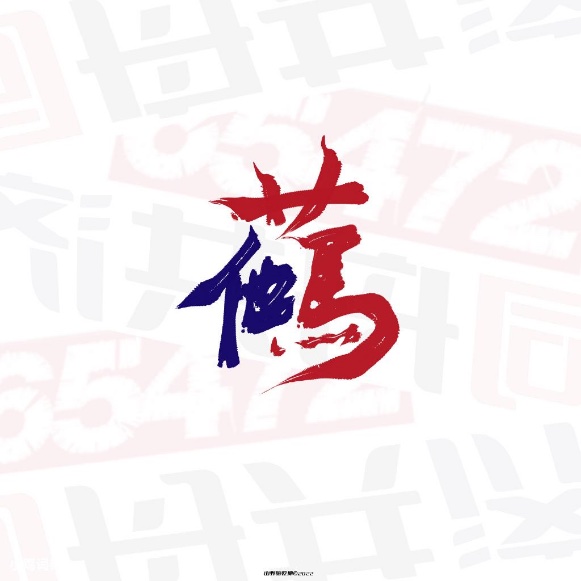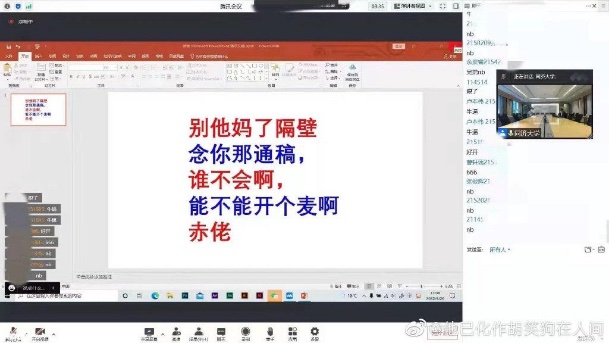Tongji University's creative Sinographic design
« previous post | next post »
Some amazing happenings at Shanghai's Tongji University, one of China's top institutions of higher learning. It seems that, as part of the general lockdown of Shanghai, the students — locked in their dorm rooms for weeks on end — have been suffering like everyone else. Not only do they lack sufficient food and water, the food that they are given is full of tapeworms and other such unwanted ingredients. So they complained on Weibo, WeChat, and other social media platforms. The authorities scrubbed and censored the complaints as fast as they could, but when things got out of hand, they decided to hold a large scale Zoom meeting with students, faculty, and administrators all together.
Then the students became really upset because the administrators not only did not reveal their true identities, they threatened students who complained with dire consequences. Whereupon some students hacked the Zoom meeting and spread it all over the internet, to the point that the government could not keep up with all the postings, postings that elicited the sympathy of the public at large.
One of the most amusing consequences of the protests was the creation of this trisyllabic character composed of 艹 (cǎo 草 ["grass"]), tā 他 ("he / she"), and mǎ 马 ("horse") — thus combined = "cāotāmā 操他妈", or CTM for short:
This means "f*** his mother", China's "guómà 国骂 / 國罵" ("national swear word").
As for why the red and blue theme, that's because of the color arrangement of the most sensational student denunciation of the feckless university administrators, a screenshot of which I here provide for the record:
bié tā māle gébì 别他妈了隔壁 ["correct / proper" Sinographic form should be bié tā māle gè bī 别他妈了个逼] ("don’t / stop f***ing [around]") — here gébì 隔壁 ("neighbor; next door") has been euphemistically substituted for bī 逼 ("force; compel") [also often written as "B"], standing in for the filthy word "bī 屄" ("c*nt")
niàn nǐ nà tōng gǎo 念你那通稿 ("read your wire-copy") — i.e., the students want a real dialog with actual administrators, not just someone reading off a prepared copy
shéi bù huì a 谁不会啊? ("who can’t [read something pre-written]"?)
néng bù néng kāi gè mài a 能不能开个麦啊? ("can you turn on your microphone"? [meaning: "do you dare to expose your own voice / identity?"] )
chìlǎo 赤佬 ("bastard!" [native Shanghainese word, lit. “red-fellow") — this expression dates back to the heyday of capitalist Shanghai when the KMT hunted down commies [VHM: update see comments below]
Explications of esoteric explicatives! Pretty nasty stuff to put in the face of communist officials!
For more about the revolt at Tongji University, see here (in Chinese).
Selected readings
- "Blindly busy" (8/26/18)
- "When intonation overrides tone" (6/4/13)
- "Yet another polysyllabic Chinese character" (10/31/16)
- "A new polysyllabic character" (4/3/16)
- "Polysyllabic characters in Chinese writing " (8/2/11)
- "Polysyllabic characters revisited " (6/18/15)


Ursula said,
April 29, 2022 @ 1:06 pm
Thanks for the information. There, however, seems to be some confusion about the etymology of the word 赤佬, which actually traces its back to the fedual period, when criminals and unwilling soilders got marked with red paint, and some emperors, trying to show mercifulness, may choose to circle in red a piece of paper filled with criminals' names before executing those marked red while pardoning the unmarked. It is such ancient practices that leave this word used in the sense of "a hateworthy, ominous person" .
Mark Metcalf said,
April 29, 2022 @ 1:15 pm
In 2009, an analogous character for 草泥马/ made the rounds: https://web.archive.org/web/20090324052521/http://shanghaiist.com/2009/03/23/character_of_the_day.php
An informative and entertaining article that discusses the character is entitled "Harmony as language policy in China: an Internet perspective" and published in Language Policy can be downloaded here: https://www.researchgate.net/publication/282546200_Harmony_as_language_policy_in_China_an_Internet_perspective
Victor Mair said,
April 29, 2022 @ 3:09 pm
Wiktionary
https://en.wiktionary.org/wiki/%E8%B5%A4%E4%BD%AC
赤佬
(Wu, colloquial) ghost; corpse
(Wu, vulgar, derogatory) a contemptible person; idiot; arsehole; dickhead
儂個赤佬![Shanghainese, trad.]
侬个赤佬![Shanghainese, simp.]
[nʊŋ²² ɡ̊əʔ⁴⁴ t͡sʰəʔ³³ lɔ⁴⁴] [IPA]
You motherfucker!
赤佬
zdic
https://www.zdic.net/hans/%E8%B5%A4%E4%BD%AC
赤佬,吴语词汇,苏州等地区出现频率较高。
苏州话读作tsheh lau、 无锡话读作:tshah lau,贬义词。
“赤佬”原本对明朝军队中士兵(兵户)的称呼(贬义)。汉语中“赤”指红色的意思,“佬”一般在南方方言中是指社会地位不高的男性。“赤佬”即穿红色衣服的男人。明朝属火德、尚红色,所以士兵的衣服是都是红色。明代采用卫所,兵户半兵半农,打仗时一个军户出一个兵,和平时期当农民,并且是世袭的身份不可转换的。因此当兵这种职业倍受蔑视,被认为社会地位及其低下而且世代没有前途。
Google Translate
red guy Chilao, Wu language vocabulary, Suzhou and other regions appear more frequently.
Suzhou dialect reads tsheh lau, Wuxi dialect reads: tshah lau, derogatory term.
"Chilao" was originally the name (derogatory) for the soldiers (soldiers) in the Ming Dynasty army. "Chi" in Chinese means red, and "lao" generally refers to men with low social status in southern dialects. A "red guy" is a man in red. The Ming Dynasty belonged to fire and was still red, so the soldiers' clothes were all red. In the Ming Dynasty, the guards were adopted, and the military households were half soldiers and half farmers. In war, each military household sent one soldier, and in peacetime, he became a peasant, and his hereditary status was irreversible. Therefore, the profession of being a soldier is highly regarded with contempt, and is considered to be of low social status and no future for generations.
nbmandel said,
May 1, 2022 @ 9:30 am
Accidental, no doubt, but amusing comparison between the Ming "red guy," a low-level soldier, and the Star Trek "redshirt," the crewmember(s), uniformed in red, unnamed, and dialogue-less, who accompanies our heroes to the episode's planet in order to be cannon (ray gun) fodder.
Johannes said,
May 3, 2022 @ 3:50 am
My Shanghainese aunties always called me ʃiɔtsʰəʔlɔ 小赤佬
LOL
I know they're saying "you little punk/ idiot" but I've always wondered about the etymology.
Does it literally mean a "ghost"…?
I'm thinking it's translated back into colloquial Mandarin as "little ghost" 小鬼 meaning "punk/kid" but perhaps it's also used euphemistically by some Shanghainese as "ghost" when they don't want to refer to the spirit/ entity?
Fascinating military etymolgy going back to the Ming, but I like the regional dialect use & KMT reference here from the students! These ʃiɔtsʰəʔlɔ are ballsy!